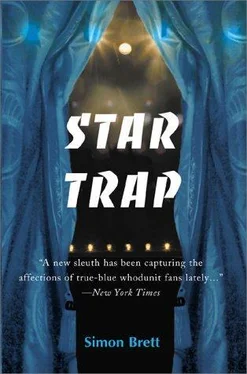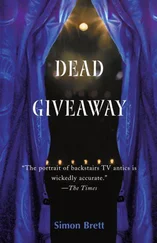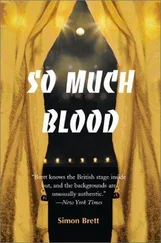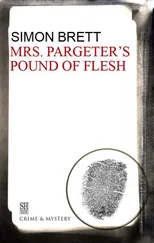Simon Brett - Star Trap
Здесь есть возможность читать онлайн «Simon Brett - Star Trap» весь текст электронной книги совершенно бесплатно (целиком полную версию без сокращений). В некоторых случаях можно слушать аудио, скачать через торрент в формате fb2 и присутствует краткое содержание. Жанр: Классический детектив, на английском языке. Описание произведения, (предисловие) а так же отзывы посетителей доступны на портале библиотеки ЛибКат.
- Название:Star Trap
- Автор:
- Жанр:
- Год:неизвестен
- ISBN:нет данных
- Рейтинг книги:5 / 5. Голосов: 1
-
Избранное:Добавить в избранное
- Отзывы:
-
Ваша оценка:
- 100
- 1
- 2
- 3
- 4
- 5
Star Trap: краткое содержание, описание и аннотация
Предлагаем к чтению аннотацию, описание, краткое содержание или предисловие (зависит от того, что написал сам автор книги «Star Trap»). Если вы не нашли необходимую информацию о книге — напишите в комментариях, мы постараемся отыскать её.
Star Trap — читать онлайн бесплатно полную книгу (весь текст) целиком
Ниже представлен текст книги, разбитый по страницам. Система сохранения места последней прочитанной страницы, позволяет с удобством читать онлайн бесплатно книгу «Star Trap», без необходимости каждый раз заново искать на чём Вы остановились. Поставьте закладку, и сможете в любой момент перейти на страницу, на которой закончили чтение.
Интервал:
Закладка:
Significantly, with the agent away, in spite of occasional flashes of temper from Christopher Milton, there were no more incidents while Lumpkin! was in Leeds.
PART III
CHAPTER NINE
Charles was glad to get to Bristol. He hadn’t enjoyed the previous few days. Investigations apart, Leeds had ended in scenes of cynical recrimination with Ruth. After a final fierce coupling on the Sunday morning and a silent drive to the station, he had had a long slow journey to King’s Cross for her unspoken accusation to fester in his mind. He couldn’t just laugh it off. As many times before, he cried out for the ability to say, that was good while it lasted, or that didn’t work, oh well, time to move on. But he was bad at the sort of insouciance that should have accompanied his style of sex life. Feelings kept snagging, he kept feeling sorry for people, kept feeling he was using them. And, as always, lacking the self-righteousness necessary for anger, he ended up feeling self-disgust.
A half-day in London hadn’t helped his mood. The bed-sitter in Hereford Road had not got less depressing in his absence. With the change in the weather it was as cold as a morgue when he opened the door. Nor did Sunday papers he’d bought offer any cheer. Bombs in London restaurants and the continuing apparent hopelessness of the Herrema siege led to fears of the imminent collapse of society, that terrible plunging feeling that tomorrow everything will stop and animal chaos will reign.
He rang his wife Frances in an attempt to shift the mood. But her phone just rang and rang and he stood, his finger dented by the twopence in the coin-box and his mind drifting, trying to remember what she had said in their last conversation about this new man she was seeing, forming silly fantasies of her with the new man, even of her upstairs in their bed with him, hearing the phone and saying, ‘Shall we answer it?’ and him saying, ‘No’. It was stupid, childish; it was as if he were again a sixteen-year-old, his stomach churning as he asked his first girl out to the pictures. And this was Frances, for God’s sake, Frances whom he knew so well, who was so ordinary he had left her. But his feelings swirled around, unanchored. He put the phone down.
Back in his room (the telephone was outside on the landing) he had turned immediately to the obvious solace, a half-full (or, in his current mood, hall-empty) bottle of Bell’s. He drank with the kamikaze spirit of self-pity, sadly identifying with Everard Austick.
So Bristol, by comparison, was pleasant. He got a lift down on the Monday morning with a couple of the dancers who lived in Notting Hill and, apart from the fact of being in company, the staged sparkle of their camp chatter put him in a good mood. Then there was where he was staying. Julian Paddon, an actor friend from way back, was a member of the resident company at the Old Vic and had issued an immediate invitation when he heard Lumpkin! was coming to Bristol. His wife Helen was charming and had the enormous advantage after Ruth that Charles didn’t fancy her at all (and even if he had, she was eight months pregnant and thus satisfactorily hors de combat).
Julian, whose nesting instinct, always strong, had been intensified by regular employment and the prospect of an addition to his family, had rented a flat in a Victorian house in Clifton and Charles was made to feel genuinely welcome.
Lumpkin! too responded to the new town. The day’s break after the heavy rehearsal schedule in Leeds meant that everyone came to it with renewed vigour. The makeshift musical arrangement for I Beg Yours? had been improved and expanded by Leon Schultz, an American arranger flown over at enormous expense by an edgy management. The song was greatly enhanced and on the first night in Bristol it stopped the show. Once again Christopher Milton’s theatrical instinct had been vindicated. The management was so pleased with the song that they asked Schultz to do new arrangements for all other numbers in the show. It would mean a lot more rehearsal, but in the new mood of confidence no one complained.
Away from the gloom of Leeds, Charles found it difficult to believe in thoughts of sabotage. The long sequence of crimes he had rationalised became unreal, another part of the general confusion over the show and Ruth which Leeds had meant for him. When he unpacked at Julian’s flat, he had to look closely at the Gordon’s gin bottle to convince himself that anything criminal had ever happened.
Part of his relaxation was due to Dickie Peck’s absence. His suspicions had now homed in firmly and until the agent rejoined the company, he did not fear further incidents. What he should do when another occurred was something he tried not to think about.
Anyway, rehearsals kept him busy. Desmond Porton from Amulet Productions was to come and see the show on the Thursday and give the final all-clear for the scheduled first night at the King’s Theatre on Thursday, November 27th. That gave a sense of urgency and a healthy edge of determination to everyone in the show.
The first two nights made Charles begin to think he was, for possibly the first time in his life, about to be connected with a success. Apart from reflections on the irony of a fate which withheld major triumph from shows he had cared about in favour of the commercial banality of Lumpkin! it was a pleasant feeling.
He was sitting in the pub during the Tuesday performance (having dutifully checked in for the ‘half’ and let the stage manager know where he’d be) when the girl approached him. Her pale blue eyes had the unfocused stare of contact lenses, but there was nothing vague about her manner. ‘Are you in Lumpkin!?’ she asked, the directness of the question emphasised by an American accent.
‘Fame at last,’ he replied with irony. ‘Yes, I am.’
‘Good, I thought I recognised you. I saw the show last night.’
‘Ah.’ Charles left the pause for comment on his performance which no actor can resist.
But the girl didn’t pick up the cue. ‘My name’s Suzanne Horst,’ she said. ‘I’m a free-lance journalist.’
He emitted another ‘Ah’, again succumbing to an actor’s instinctive reaction that the girl wanted to write something about him.
She soon put him right on that. ‘I’m trying to make contact with Christopher Milton.’
Of course. He blushed for having suspected anything else, and let out another multi-purpose ‘Ah’.
‘Would you introduce me to him?’
‘Well…’ This was rather difficult. The past month with Christopher Milton had revealed to Charles how carefully the star’s contact with the press and media was regulated by his agent. To introduce an unexpected journalist could be a serious breach of professional etiquette. ‘I think probably the best thing you could do would be to make contact with his agent. It’s Dickie Peck of Creative Artists.’
‘I don’t want to mess about with agents. Anyway, I’m here in Bristol. What’s the point of contacting a guy in London about someone who’s only a hundred yards away at this moment?’
There wasn’t a great deal of logic about it, but that was the way stars worked, Charles explained.
She was not put down. ‘Yes, I know that’s the correct way to go about things, but I don’t want to go the correct way. I want to go the way that’ll get me the interviews I’m after.’
‘Well, I don’t know what to suggest.’ Charles felt churlish, but thought he was probably doing the right thing. ‘What are these interviews you are after?’
‘One’s for radio. Only got Radio Brighton interested at the moment, but I’m sure I’ll be able to get it on one of the networks. That’s only secondary, anyway. The main thing I want him for is an article I’m doing on the nature of stardom. Want to know what makes him tick, you know.’
Читать дальшеИнтервал:
Закладка:
Похожие книги на «Star Trap»
Представляем Вашему вниманию похожие книги на «Star Trap» списком для выбора. Мы отобрали схожую по названию и смыслу литературу в надежде предоставить читателям больше вариантов отыскать новые, интересные, ещё непрочитанные произведения.
Обсуждение, отзывы о книге «Star Trap» и просто собственные мнения читателей. Оставьте ваши комментарии, напишите, что Вы думаете о произведении, его смысле или главных героях. Укажите что конкретно понравилось, а что нет, и почему Вы так считаете.












